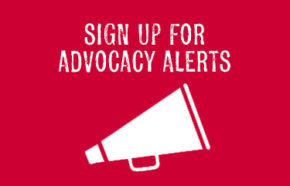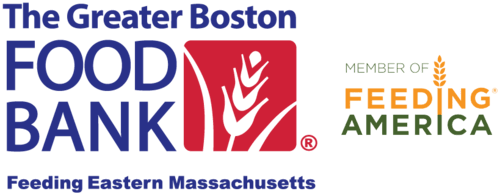Students and Advocates Testify for Hunger Free Campus Legislation at College Hunger Day of Awareness
Students and advocates from the Hunger Free Campus Coalition (HFCC), a statewide group co-led by The Greater Boston Food Bank, made their voices heard at the State House on Monday, September 18, at a hearing for the Joint Committee on Higher Education, in support of “An Act Establishing the Massachusetts Hunger Free Campus Initiative” (S835 / H1293).
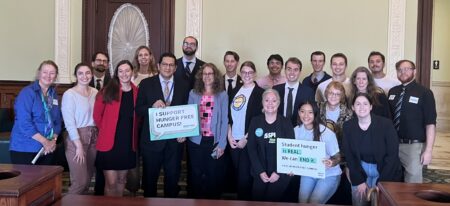
The bill, filed by Senator Joan D. Lovely (D-Salem) and Representatives Andy Vargas (D-Haverhill) and Mindy Domb (D-Amherst), and supported by a bipartisan group of legislators in both houses, would create a grant program within the Department of Higher Education to enable community colleges, public universities, and minority-serving institutions in Massachusetts to address hunger on campus.
After the public hearing, the HFCC met with Department of Higher Education Commissioner, Noe Ortega, to thank the Department for their stewardship of the Initiative and share how funds are making an impact on campus. Students and advocates later met with legislators to urge co-sponsorship of the bill and expanded funding in the state’s 2025 fiscal year budget.
Commissioner Ortega expressed his gratitude for the HFCC’s advocacy and his commitment to making higher education accessible to all students. “To ensure that every learner in the Commonwealth is successful,” he stated to the HFCC, “we must begin by addressing their basic needs which are going to impact their success.”
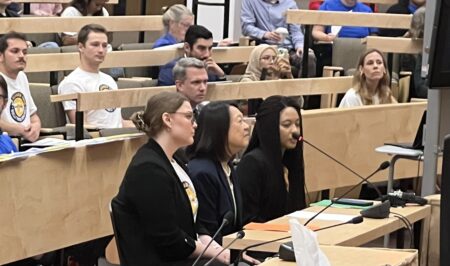 The statistics on hunger in Massachusetts are alarming. GBFB’s 2023 statewide study on food equity and access found that one in three people in the Commonwealth face food insecurity. These rates are higher for students at Massachusetts’ public universities and community colleges, and especially for students from groups facing historical and contemporary disinvestment and discrimination, including Black, Latinx, and LGBTQ+ students. Issues of affordability are particularly severe for students burdened by tuition and high cost of living; students recounted skipping meals to make ends meet in their written and oral testimony at the hearing.
The statistics on hunger in Massachusetts are alarming. GBFB’s 2023 statewide study on food equity and access found that one in three people in the Commonwealth face food insecurity. These rates are higher for students at Massachusetts’ public universities and community colleges, and especially for students from groups facing historical and contemporary disinvestment and discrimination, including Black, Latinx, and LGBTQ+ students. Issues of affordability are particularly severe for students burdened by tuition and high cost of living; students recounted skipping meals to make ends meet in their written and oral testimony at the hearing.
“Some of my friends have expressed anxiety and embarrassment for finding themselves painfully hungry,” said Michael Killian, a student at UMass Boston. “Hunger and poverty in the Commonwealth can be sources of shame and also have significant impacts on students’ health and cognitive development.”
Recounting GBFB’s 30-year track record of partnering with colleges, Catherine Lynn, GBFB’s Vice President of Communications and Public Affairs, remarked, “We are delighted to see the state making significant investments in higher education, but we must first make sure students’ basic needs are met.”
“Massachusetts is already one of the most expensive places to live, which means food is often the first thing to go without for college students,” said lead House sponsor on the bill, State Representative Andy Vargas (D-Haverhill). “The legislature just made a historic investment in funding universal school meals permanently, and the Hunger-Free Campus Initiative is a continuation of that work.”
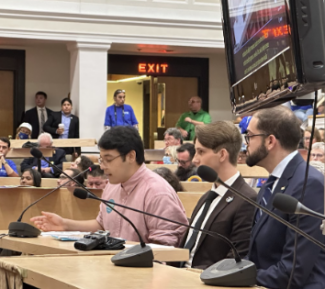 The Greater Boston Food Bank co-leads the Massachusetts Hunger-Free Campus Coalition with the Massachusetts Law Reform Institute and the Food Bank of Western Massachusetts. Formed in 2019 with the goal of building on existing resources and services to address food insecurity on Massachusetts’ public and minority-serving campuses, including expanding SNAP outreach and supporting student-serving food pantries on and off campus, the Coalition has grown in scale to 120 advocates representing nearly 50 organizations and institutions. The data and research coupled with the lived expertise of college students informed the campaign’s aims, and a successful pilot using American Rescue Plan Act funds demonstrated both the power of hunger-free campus approaches and the urgent need for continued support. The Coalition is eager for the passage of the bill which builds off a recent victory of $1 million secured for the Hunger Free Campus Initiative in the FY24 state budget.
The Greater Boston Food Bank co-leads the Massachusetts Hunger-Free Campus Coalition with the Massachusetts Law Reform Institute and the Food Bank of Western Massachusetts. Formed in 2019 with the goal of building on existing resources and services to address food insecurity on Massachusetts’ public and minority-serving campuses, including expanding SNAP outreach and supporting student-serving food pantries on and off campus, the Coalition has grown in scale to 120 advocates representing nearly 50 organizations and institutions. The data and research coupled with the lived expertise of college students informed the campaign’s aims, and a successful pilot using American Rescue Plan Act funds demonstrated both the power of hunger-free campus approaches and the urgent need for continued support. The Coalition is eager for the passage of the bill which builds off a recent victory of $1 million secured for the Hunger Free Campus Initiative in the FY24 state budget.
Testifying on the urgent need to pass legislation, University of Massachusetts Lowell student Sean Simonini called for a “courageous commitment to the learners of today and the leaders of tomorrow that no student will ever have to face hunger alone again.”
Passing the Hunger Free Campus Initiative will help students across the Commonwealth to focus on their studies and fulfill the investment that we’ve made in them through their education. The next generation of Massachusetts’ scientists, teachers, entrepreneurs, social workers – and, yes, activists – depends on it.
Take Action: Learn more about the MA Hunger Free Campus Coalition and consider submitting written testimony in support of An Act establishing the Hunger Free Campus Initiative.
